
-
Find the right food for your petTake this quiz to see which food may be the best for your furry friend.Find the right food for your petTake this quiz to see which food may be the best for your furry friend.Featured products
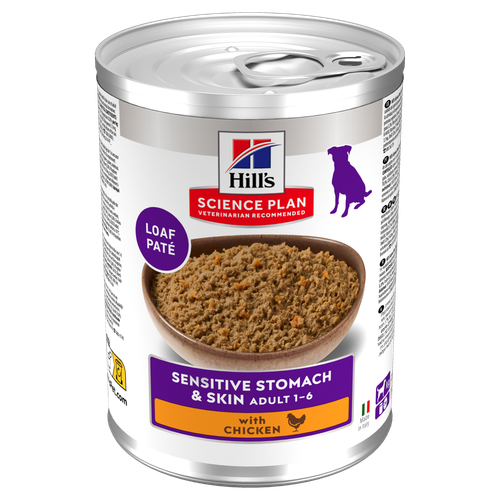 Sensitive Stomach & Skin Dog Food
Sensitive Stomach & Skin Dog FoodHill's Science Plan Sensitive Stomach & Skin Adult Wet Dog Food with Chicken is a complete premium dog food for adult dogs from 1 year. This savoury tinned loaf is enriched with ingredients that support digestive health & skin care.
Shop Now Perfect Digestion Small & Mini Adult Dog Food
Perfect Digestion Small & Mini Adult Dog FoodHill's Science Plan Perfect Digestion Small & Mini Adult Dog Food with Turkey is a complete premium pet food for small breed adult dogs aged 1–6 years. This deliciously smooth mousse is precisely balanced to deliver the appropriate amount of energy and to support digestive health in adult, small breed dogs.
Shop Now Perfect Weight Small & Mini Adult Dog Food
Perfect Weight Small & Mini Adult Dog FoodHill's Science Plan Adult Small & Mini Dog Food with Turkey is a complete premium pet food for adult small dogs from 1 year old that are prone to weight gain or slightly overweight. This deliciously smooth mousse is formulated to deliver the appropriate amount of energy to support weight maintenance in adult dogs.
Shop NowFeatured products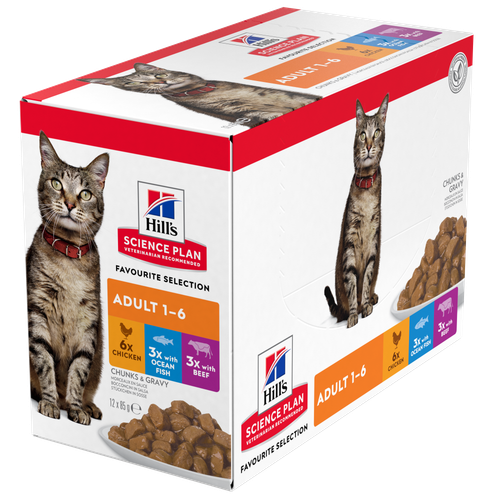 Adult Wet Cat Food with Chicken
Adult Wet Cat Food with ChickenTender chunks in gravy for cats, with high-quality protein to maintain lean muscle. With vitamin E and omega-3s & -6s for healthy skin and balanced minerals to support healthy vital organs.
Shop Now Mature Adult Wet Cat Food with Chicken
Mature Adult Wet Cat Food with Chicken
Tender chicken chunks in gravy for mature adult cats. Made with easy-to-digest ingredients, high-quality protein for lean muscle maintenance and antioxidant vitamins C+E for optimal health.
Shop Now with Ocean Fish, Chicken
with Ocean Fish, ChickenTender chicken chunks in gravy for cats, with L-carnitine and fewer calories for ideal weight management. Packed with high-quality protein, omega-6s, and vitamin E for shiny fur and healthy skin.
Shop Now -
Dog
- Dog Tips & Articles
-
Health Category
- Weight
- Food & Environmental Sensitivities
- Urinary
- Digestive
- Joint
- Kidney
-
Life Stage
- Puppy Nutrition
- Adult Nutrition
- Senior Nutrition
Cat- Cat Tips & Articles
-
Health Category
- Weight
- Skin & Food Sensitivities
- Urinary
- Digestive
- Kidney
-
Life Stage
- Kitten Nutrition
- Adult Nutrition
Featured articles Show some love with wet foods: a great choice for pets with health issues
Show some love with wet foods: a great choice for pets with health issuesShow some love with wet foods: a great choice for pets with health issues.
Read More The Right Diet For Your Pet
The Right Diet For Your PetIn people, the right diet is very important. If you are eating the wrong way for your metabolism, activity level, age and lifestyle you could end up with health issues.
Read More The Incredible Science Behind Your Pet's Microbiome
The Incredible Science Behind Your Pet's MicrobiomeLearn what your pet's microbiome is, how it contributes to your pet's gut and overall health, and why nutrition is important in maintaining healthy microbiomes.
Read More -


Decorating with plants and flowers is a great way to beautify your home and garden, but some of your favourite foliage can also be toxic to your cat. Before adding new greenery to your home or garden, it’s important to read up on what plants are poisonous to cats so that you can keep your cat or kitten safe.
Plants That Are Poisonous to Cats
From houseplants to garden plants, including vegetables and herbs, here is a selection of plants and flowers that are toxic to cats.
1. Lilies
People tend to use "lily" as an all-encompassing term, but there are about 90 species in all, including the Asiatic lily, Easter lily and lily of the valley. What do they have in common other than a name? They're all poisonous plants to cats. In fact, they're one of the most toxic plants for your feline friend; ingestion can lead to immediate kidney failure.
2. Eucalyptus
Though rich in fibre, eucalyptus isn't part of a healthy diet. The leaves are toxic to most animals, except koalas and a few wild bird species.
3. Jade
Succulents, like jade, are the perfect option for those who don't have a green thumb because they're low-maintenance and beautiful. Unfortunately, jade is also one of several succulents that are poisonous to cats.
4. Milkweed
Planting common milkweed in gardens has become a popular way to support monarch butterfly populations. However, the fruit of the milkweed plant is toxic to both animals and humans.
5. Onion
Onions are a staple of dinner tables around the globe, especially in China and India, the top two onion-producing countries. But onions, as well as garlic, leeks, scallions, chives and shallots, are toxic to many animals, including cats and dogs.
6. Tomatoes
The fruit of the tomato is harmless to your cat, but its stem and leaves can be toxic. Add this to your list of human food not to give your cat.
7. Daffodils
These popular springtime annuals, with their deep yellow and white colouring, look terrific bunched together. But don't let their beauty deceive you. According to a study published in the Canadian Veterinary Journal, daffodil flowers, leaves and bulbs can all be poisonous to cats.
8. Hyacinth
Sweet-smelling hyacinth flowers are native to the eastern Mediterranean. Close relatives include water hyacinths and tulips. Despite their beauty, these bulb flowers contain alkaloids that can be dangerous for your cat.
9. Mistletoe
The practice of kissing under the mistletoe dates back to the 18th century. For cats, though, these plants lead not to everlasting love but to serious health issues, including cardiovascular shutdown. Other festive plants, like amaryllis, also pose problems for your cat's health and should be kept out of the house.
10. Mandrake
The flowering mandrake shrub originated in the Mediterranean region and has had a mythical reputation for centuries. But its toxicity isn't just folklore. The mandrake root is highly poisonous to cats (and to humans).
11. Azaleas
Part of the rhododendron family, an azalea is a small, deciduous species that is poisonous to cats, who can suffer gastrointestinal, cardiovascular or central nervous system issues.
Other common plants that are toxic to cats include:
Croton (Joseph's Coat)
Caladium (Elephant Ear)
Dieffenbachia (Dumb Cane)
Ficus (rubber plants, weeping and variegated fig plants)
Philodendron
Monstera (Swiss Cheese Plant)
Oleander
Poinsettia
Christmas cherry
Holly berries
Toxicity can vary based on the type of plant and how much is ingested. For instance, poinsettias are mildly toxic to most cats. However, some cats are especially susceptible and can experience clinical signs severe enough for medical treatment, even in smaller amounts.


Tasty Tips
Curious about getting a new plant for the home or garden, but want to know if it is poisonous to your cat? The charity Cats Protection has comprehensive guides for indoor plants, outdoor plants, flowers, herbs and weeds.
Signs of poison ingestion
Every plant toxin can cause a different reaction. For example, if your cat eats a plant in the onion family, it could harm their red blood cells and cause anaemia, leading to weakness, reduced appetite and pale gums. If your cat ingests lily pollen, they might vomit, show excessive drooling or have seizures, according to the PDSA.
While side effects differ depending on the specific plant, there are common signs of poisoning you can watch out for, including:
Vomiting
Diarrhoea
Coughing
Difficulty breathing
Disorientation
Heart palpitations
Loss of appetite
Dilated pupils
Excessive licking or scratching
Seizures
Sadly, in some cases, sudden death
Unless you catch your cat in the act, you may not know they've ingested toxic plant material. If your cat exhibits any of these signs for an unknown reason and has access to plants or flowers poisonous to cats, contact your veterinarian right away.
What to Do If Your Cat Ingests a Poisonous Plant
If you suspect your cat has ingested poisonous plants, call your veterinarian immediately. If your veterinarian isn't available, call a pet poison control centre. Keep these phone numbers handy in the event of an emergency.
Unless a pet health professional tells you to do so, Cats Protection warns that trying to induce vomiting in your cat may not be helpful. In some cases, it can be more dangerous for them to vomit whatever they consumed than to leave the toxin in their stomach. Always follow the veterinarian's specific instructions.
At the veterinary clinic, the veterinarian will perform an exam and any blood tests required to diagnose the poisoning and determine the treatment.
Poison Prevention
Keeping your cat safe at home from plants poisonous to cats is fairly easy — don't bring toxic plants into your home, even if it means declining a gorgeous bouquet of flowers.
It gets a little trickier for outdoor cats, but there are ways you can reduce the chance of accidental ingestion. International Cat Care recommends that you remove the most dangerous plants from your garden and check if there are any potentially toxic plants in your neighbours' gardens. In the event that your cat gets sick, you'll be able to share the likely culprits with your veterinarian, which will allow them to better determine the cause of poisoning and the proper treatment.
Before sprucing up your home with fresh flowers and greenery, do some research and speak with your veterinarian to ensure that your choices don't include plants poisonous to cats. There are plenty of safe options, like African violets, jasmine and begonias, that are eye-catching and safe for your feline friend.


Christine O'Brien is a writer, mom, and long-time cat parent whose two Russian Blues rule the house. Her work also appears in Care.com, What to Expect, and Fit Pregnancy, where she writes about pets, pregnancy, and family life. Find and follow her on Instagram and Twitter @brovelliobrien.
Related products

Tender chicken chunks in gravy for mature adult cats. Made with easy-to-digest ingredients, high-quality protein for lean muscle maintenance and antioxidant vitamins C+E for optimal health.

Tender chicken chunks in gravy for cats, with L-carnitine and fewer calories for ideal weight management. Packed with high-quality protein, omega-6s, and vitamin E for shiny fur and healthy skin.

Tender chunks in gravy for cats, with high-quality protein to maintain lean muscle. With vitamin E and omega-3s & -6s for healthy skin and balanced minerals to support healthy vital organs.
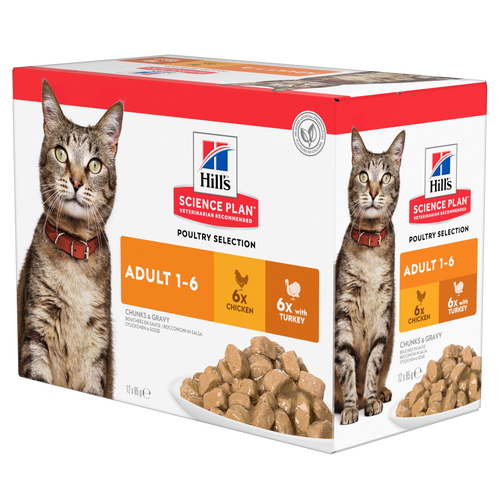
Hill's Science Plan Adult Cat Premium Chunks in Sauce with Turkey is a complete pet food for adult cats aged 1-6 years
Related articles

There are three common ways to feed a cat. Each way has its advantages and disadvantages.
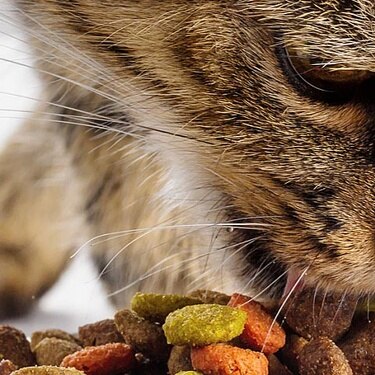
From essential vitamins & minerals to different types of meat, learn what to look for when choosing the best cat food for your feline.
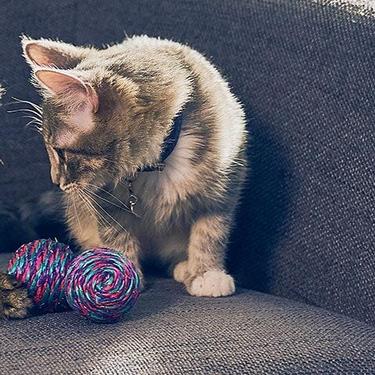
Kittens grow a lot in their first year, so it is important to provide them with the proper nutrients early, so they grow up healthy and strong. Learn more.
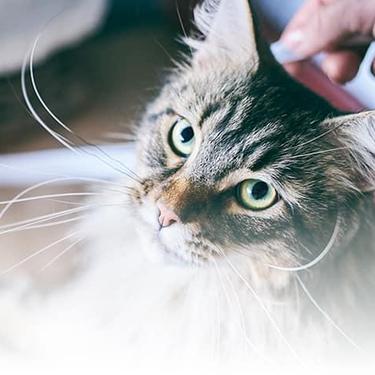
Learn how to make homemade cat treats that are healthy for your pet with this recipe from Hills Pet Nutrition.

Put your cat on a diet without them knowing
Our low calorie formula helps you control your cat's weight. It's packed with high-quality protein for building lean muscles, and made with purposeful ingredients for a flavourful, nutritious meal. Clinically proven antioxidants, Vitamin C+E, help promote a healthy immune system.
Put your cat on a diet without them knowing
Our low calorie formula helps you control your cat's weight. It's packed with high-quality protein for building lean muscles, and made with purposeful ingredients for a flavourful, nutritious meal. Clinically proven antioxidants, Vitamin C+E, help promote a healthy immune system.

